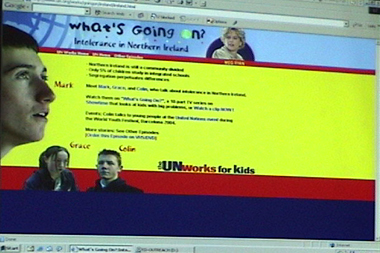2005
2005 CTAUN Conference
Friday, February 4, 2005
A World Out of Balance: Searching for Answers Through Education and the United Nations
Summary of Conference Proceedings
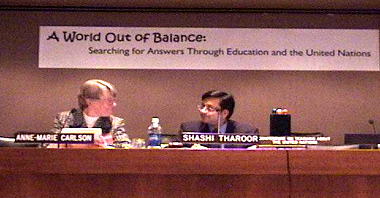
Welcome
Anne-Marie Carlson
Conference Chair
The program was opened with a welcome to those in attendance by Mrs. Anne-Marie Carlson, Conference Chair and Chair of CTAUN. She announced that 405 people had registered for the conference coming from 14 countries—the United States with 19 states and the District of Columbia represented, along with Canada, Mexico, France, Germany, Austria, Italy, Argentina, Morocco, Tunisia, Tanzania, Saudi Arabia, Uzbekistan, Turkey, and Indonesia. The last twelve countries were included this year because CTAUN has started to cooperate with the Institute of International Education (IIE), and seventeen of their Fulbright Foreign Language Teachers were in attendance.
Opening Address
Shashi Tharoor
UN Under-Secretary-General for Communications and Public Information
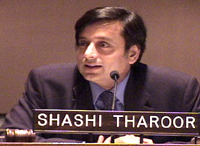 Dr. Tharoor opened his address by reminding those in attendance that “The U.N. is as much your organization as it is mine.”
Dr. Tharoor opened his address by reminding those in attendance that “The U.N. is as much your organization as it is mine.”
Speaking from his own extensive governmental, administrative and field experience, he urged us to find out as much as we can about the U.N. in order to combat the ignorance and apathy against which that organization strives. He referred to the unfavorable publicity caused by the report of the Volker committee on the Oil for Food program, which greatly shocked the U.N. as well as the world in general, adding that “We all have the right to expect the highest standards and, of course, feel much let down when these are lacking.” However, in the wake of negative publicity, the many good programs that do not make the headlines are often overlooked.
The central focus of Dr. Tharoor’s remarks was on the role of the United Nations as “the one indispensable global organization in our globalizing society.” In response to questions sometimes raised in public life about “What is the U.N. good for?” he reviewed its many accomplishments in reducing or eliminating deaths due to malaria, diphtheria, and polio. The U.N. is the only global organization that is able to lay down common standards in such areas as international flight, mail delivery, copyrights, and the preservation of world heritage sites. Mr. Tharoor recalled his own experiences in Singapore as a young man working with the boat people and noted that the U.N. was the only organization that could negotiate the admission of refugees in such a situation precisely because it does not belong to any one nation but embodies the collective interest of all. It is currently spearheading the largest rescue operations ever seen in response to the recent tsunami. The U. N. is able to coordinate relief efforts because of its universality.
During the question period at that followed, Dr. Tharoor commented that the greatest obstruction to action in the U.N. occurs when member states do not have the political will to act. Yet member states are also its greatest strength. In response to suggestions for expanding the Security Council beyond the configuration of the victors of World War II, he stated that it would be important to balance a broader representation with efficacy. He touched briefly on the importance to the U. N. of its location in New York and referred to the current need for renovation of the building after fifty years. Finally, he stressed the need for support from civil society, and noted that the body needs to be seen as broadly representative in order to “work for common objectives in the name of our common humanity.”
A World Out of Balance: Searching for Answers Through Education and the United Nations
Morning Panel
Issues in a World Out of Balance
Dr. Nancy Brown
Dean of the Graduate School, The College of New Rochelle, New Rochelle, N.Y., Moderator.
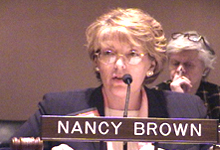 Dr. Brown opening the panel by suggesting that we begin by thinking about children we know in our own homes and schools. Children around the world may have much different experiences, being subjected to child labor, child trafficking, migration, and they may experience these things at different times in their lives. How can we help the children with whom we are in touch understand what children in other parts of the world may be going through? She then introduced the speakers.
Dr. Brown opening the panel by suggesting that we begin by thinking about children we know in our own homes and schools. Children around the world may have much different experiences, being subjected to child labor, child trafficking, migration, and they may experience these things at different times in their lives. How can we help the children with whom we are in touch understand what children in other parts of the world may be going through? She then introduced the speakers.
Mr. Djankou Ndjonkou
Director, New York Office, International Labor Organization (ILO)
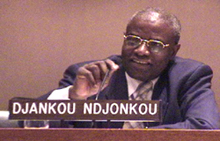 Mr. Ndjonkou stressed the fact that the ILO pays great attention to human rights issues, particularly as they have an impact on the most vulnerable groups, such as children, and that they work with all agencies to address these issues. Child labor is one of ILO’s core concerns. The first summit on child labor was held in 1990. In 1992 it launched the IPEC program, which is now working in 82 countries to eliminate child labor.
Mr. Ndjonkou stressed the fact that the ILO pays great attention to human rights issues, particularly as they have an impact on the most vulnerable groups, such as children, and that they work with all agencies to address these issues. Child labor is one of ILO’s core concerns. The first summit on child labor was held in 1990. In 1992 it launched the IPEC program, which is now working in 82 countries to eliminate child labor.
Child labor is a complex phenomenon and can take on forms that are complex and at times hidden. Domestic labor is hard to monitor. Other forms, such as drug trafficking, child soldiers or prostitution are more visible. These are the worst forms of child labor. Among reasons for the spread of child labor are: poverty, which is undoubtedly the main reason; a lack of social support systems; the number of children in a family; migration; and the spread of HIV/AIDS. Child labor is not restricted to developing countries; it is a world-wide problem. The number of children involved is estimated to be between 200 million and 240 million. It is seen as the major obstacle to the education of children.
Carol Smolenski
Executive Director, ECPAT-USA (End Child Prostitution, Child Pornography, and Trafficking Children for Sexual Purposes)
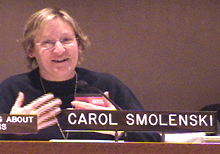 According to Ms. Smolenski’s group, from 14,000 to 17,000 children are trafficked into the United States each year. Trafficking is defined as being brought into a country and then held under some sort of control. There are various types of control situation, including domestic work, factory work, food service, construction work, agricultural work, and prostitution. Children are brought from many countries and through many routes, such as from Central America and through Mexico into the U.S. Sometimes children are kidnapped, sometimes they run away from home to escape child abuse or for other reasons. Children may be left homeless from war. Ms. Smolenski cited the notice given to the possibilities of trafficking due to the recent tsunami, and stated that this could be a long-term risk. Street children in general are vulnerable, as are all children who have no one to care for them. Sometimes the trafficker forms an emotional bond with the child, promising a better life. There may be from 200,000 to 300,000 children now trafficked into the United States.
According to Ms. Smolenski’s group, from 14,000 to 17,000 children are trafficked into the United States each year. Trafficking is defined as being brought into a country and then held under some sort of control. There are various types of control situation, including domestic work, factory work, food service, construction work, agricultural work, and prostitution. Children are brought from many countries and through many routes, such as from Central America and through Mexico into the U.S. Sometimes children are kidnapped, sometimes they run away from home to escape child abuse or for other reasons. Children may be left homeless from war. Ms. Smolenski cited the notice given to the possibilities of trafficking due to the recent tsunami, and stated that this could be a long-term risk. Street children in general are vulnerable, as are all children who have no one to care for them. Sometimes the trafficker forms an emotional bond with the child, promising a better life. There may be from 200,000 to 300,000 children now trafficked into the United States.
Child trafficking is a supply and demand business. However, people are now speaking out against this situation. Memos of understanding have been drafted among governments to accomplish repatriation. Legislation against sexual trafficking has now been passed in the United States. Ms. Smolenski encouraged the attendees to read the ECPAT brochure available at the conference and be willing to hear about and talk about these issues.
At the end of the session, a question from the audience referred to the statement that child prostitution is a “supply and demand” situation, asking whether there was an increased demand. Ms. Smolenski responded that the demand for children in the sex business is very real. Children are being sexualized at a younger age, and the demand for younger children is increasing.
Dr. Eva Sandis
Member of the NGO Center for Migration Studies and Vice-Chair, NGO Committee on the Family
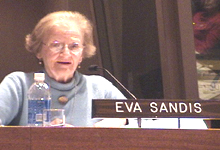 Dr. Sandis noted that increased migration is one of the chaotic issues in a world that is out of balance, particularly with regard to the economy. After citing a number of reasons that might affect migration patterns, she focused particularly on globalization. Stating that globalization has had benefits, she discussed the growth in finance and in trade from far-flung regions. Transnational corporations have developed new strategies in the production process, breaking processes into discrete piece and farming these out to various locations. As a result, the strength of working groups is being eroded or destroyed.
Dr. Sandis noted that increased migration is one of the chaotic issues in a world that is out of balance, particularly with regard to the economy. After citing a number of reasons that might affect migration patterns, she focused particularly on globalization. Stating that globalization has had benefits, she discussed the growth in finance and in trade from far-flung regions. Transnational corporations have developed new strategies in the production process, breaking processes into discrete piece and farming these out to various locations. As a result, the strength of working groups is being eroded or destroyed.
Dr. Sandis indicated that there are direct links between global economy and migration. There are not only an increased number of migrants, there are also new geographical patterns. Migration used to be primarily from south to north; now migrants go to any country where there is a possible need for labor. It has been estimated that three percent of the world’s population are migrants.
In suggesting ways that issues regarding migration might be addressed, Dr. Sandis suggested that it is important to spell out the linkages between a global market economy and migration. Should people have to migrate in order to survive economically? The reality is that most people would prefer to live in their own countries. More effort should be made to develop a fairer globalization process. Globalization should be steered away from narrow economic competition and should be people centered. It is also important to reduce internal conflicts that destroy a nation’s infrastructure. Finally, it is important to realize that all migrants suffer disadvantages in different countries. It is important to monitor existing regulations on migrant workers and to look at the particular needs of women in this regard.
Afternoon Session
Terrorism
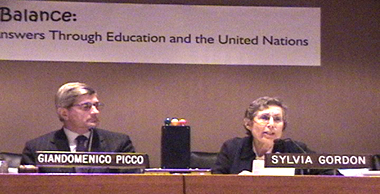
Mr. Giandomenico Picco
the author of Man Without a Gun, is a former U.N. Assistant-Secretary-General for Political Affairs, and Chairman and CEO, GDP Associates, assisting those who want to do business in the Middle East
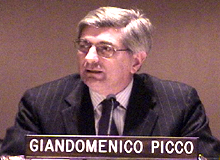 Ms. Gordon began her introduction by stating that she had taught Mr. Picco’s son at the United Nations International School. Mr. Picco, she went on to say, was a trusted dignitary whose talent lay in very delicate negotiations, so trusted and revered that parties often refused to go on with their negotiations without him.
Ms. Gordon began her introduction by stating that she had taught Mr. Picco’s son at the United Nations International School. Mr. Picco, she went on to say, was a trusted dignitary whose talent lay in very delicate negotiations, so trusted and revered that parties often refused to go on with their negotiations without him.
Mr. Picco continued with the theme of father-son relationships, saying that he was proud to be the father of his son and that he was often faced with the decision whether to be a father first or to be a U. N. official first. In his book he told of an episode in which it appeared that he had chosen the latter. He was in Beirut, which was ravaged at that time by civil war. One could not go anywhere as the country was riddled with check points, bombings, and killings. Business was often conducted at night. On one such occasion he was outside in the streets when he was snatched into a car, kidnapped, and taken to a clandestine place. When his hood was removed, he looked at his captor and asked, “Are you a father?” The other man finally responded hesitatingly, “Yes.” He then went on to say, “We have different ideas. But if you are a father, as I am, we have something in common. We should start with what we have in common.”
How tragic that all our cultures come to describe themselves with one word, Picco continued. “How humiliating to define who we are, to define who others are by one bloody, stupid word. And then we go to war for that.” After discussing the different kinds of terrorists, or approaches to terrorism, in the world today, he pointed to the growth of extremist groups who believe that they alone are in possession of the truth and that fewer things have done more harm in the world than this. “It is a dangerous arrogance to believe that you along are in possession of the truth.” Picco went on to say that the history of humankind is full of leaders who cannot lead without an enemy, and that an enemy is a management tool of power. Unfortunately, the enemy has become for too many the one who is diverse. There are so many who see diversity as a threat. There is a need in the world for dialog between those who see diversity as a threat and those who do not.
In closing Sylvia Gordon, the chairperson, remarked that those of us who are teachers need to stress the beauty and power of diversity.
First Afternoon Panel
Rebalancing for Tomorrow
Wilfrid Grey
Director-at-Large, CTAUN, and author of U. N. Jigsaw, Moderator
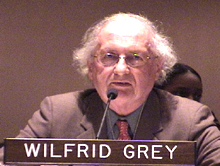 Mr. Grey opened the session by stating that we all need to think seriously about preparing a better world for the 21st century. The groups on this panel are organizations engaged in These efforts. The four presenters, chosen from among many organizations at the Information Fair, demonstrate the wide variety of direct experience involved in achieving balance in these difficult times.
Mr. Grey opened the session by stating that we all need to think seriously about preparing a better world for the 21st century. The groups on this panel are organizations engaged in These efforts. The four presenters, chosen from among many organizations at the Information Fair, demonstrate the wide variety of direct experience involved in achieving balance in these difficult times.
Marieke van Woerkom
Director of Education, Seeds of Peace
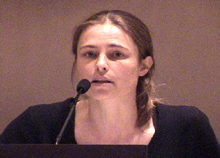 Seeds of Peace was started in 1993 after the first bombing of the World Trade Center to attempt to reconcile youth in areas of global conflict. Its founder, John Wallace, a former journalist in the Middle East, created an international summer camp in Maine for students in their early teens from Israel, Palestine and Egypt. Along with joint sports activities, they met for an hour each day to discuss issues and get to know one another as human beings. The camps have now spread to other areas such as Cyprus and Turkey, the Balkans, India and Pakistan, and Afghanistan.
Seeds of Peace was started in 1993 after the first bombing of the World Trade Center to attempt to reconcile youth in areas of global conflict. Its founder, John Wallace, a former journalist in the Middle East, created an international summer camp in Maine for students in their early teens from Israel, Palestine and Egypt. Along with joint sports activities, they met for an hour each day to discuss issues and get to know one another as human beings. The camps have now spread to other areas such as Cyprus and Turkey, the Balkans, India and Pakistan, and Afghanistan.
The founders felt that it was important to think seriously about preparing a better world for the 21st century and to raise the awareness of the future generation. Instead of looking at others as “the enemy,” it is important to understand that there are different narratives and different experiences in different parts of the world. The purpose was to put a human face on the “other side.” The organization now has ongoing dialogue between young people in these many areas.
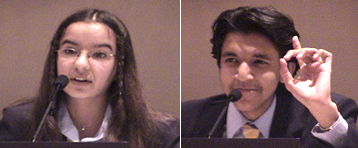
Two young people accompanied the speaker: Parnian Nazary, a sixteen-year-old girl from Afghanistan and Hassan Raza, a seventeen-year-old boy from Pakistan. Parnian attended camps in 2003 and 2004. She described how, in the beginning, those from countries that were enemies “would scream and yell at each other,” but by the end of the camp session they would have become friends. She is now studying for a year in the U.S. and would like to see the women become leaders in her own country. Hassan spoke of the anger and sense of alienation he felt when he first arrived at the camp and how he eventually managed to have a reconciling conversation with a wily old border guard whom he had originally seen as “the enemy.”
Wenchi Yu Perkins
Anti-Human Trafficking Program Officer, Vital Voices Global Partnership
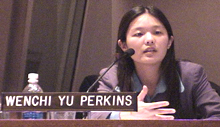 Ms. Perkins complemented the morning conference session on trafficking by stressing the importance of civil society working with governments as a powerfully balanced strategy for monitoring activities. Vital Voices is an international program for women’s issues. Policy advocacy, especially by women, has raised public awareness. She gave as an example Japan, which had not protected victims of trafficking in the country and considered members of NGOs that brought up such issues as dissidents. Vital Voices, working with the U. S. Embassy, supported a civil group of educators working to teach young children, especially girls, about harassment and trafficking. These issues were brought up in Tokyo, and in less than a year the Japanese government is now ready to enact a law of protection against trafficking.
Ms. Perkins complemented the morning conference session on trafficking by stressing the importance of civil society working with governments as a powerfully balanced strategy for monitoring activities. Vital Voices is an international program for women’s issues. Policy advocacy, especially by women, has raised public awareness. She gave as an example Japan, which had not protected victims of trafficking in the country and considered members of NGOs that brought up such issues as dissidents. Vital Voices, working with the U. S. Embassy, supported a civil group of educators working to teach young children, especially girls, about harassment and trafficking. These issues were brought up in Tokyo, and in less than a year the Japanese government is now ready to enact a law of protection against trafficking.
Policy enforcement becomes a very complex and dangerous when the government becomes entangled in the violence, as has been the case in Cambodia. In that country an NGO group was attacked when they attempted to shelter a group of 91 women rescued from trafficking. The local NGO appealed to Vital Voices, which in turn informed the U.S. Department of State and pressure was put on the Cambodian government. As a result of their action, a letter was recently sent to Secretary of State Powell that the Cambodian government would be addressing this situation.
Barry Joseph
Project Director of Newz Crew and Assistant Director, Online Leadership Program, Global Kids
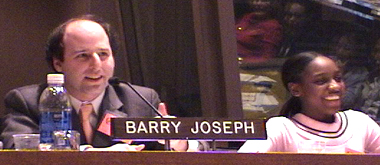
Mr. Joseph presented a totally different approach from the previous speaker by starting his project with students and their internet expertise. Newz Crew is a fifteen-year-old internet forum that provides youths from 14 to 19 with an opportunity to discuss current events online. Groups of students join in workshops after school and using information from, in particular, The News Hour, they engage in discussions both live and on line, with monitoring tools and management by teachers. Among topics discussed over the past two weeks had been: whether persons should be defined by their countries; the people of Sudan; war on Iran; the tsunami disaster; and “whether we should care if the rest of the world hates us.” With Loqueta Cort, a senior at Canarsie High School in Brooklyn, New York, which provides teen peer leadership for the program, Mr. Joseph gave several demonstration dialogues that included contributions from Barbados and Scotland in rapid-fire conversations.
Grant Burrall
Director, Global Young Leaders Conference (GYLC)
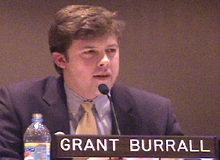 Mr. Burrall emphasized that in GYLC “we look to teachers to nominate students to the conference,” which is based in Washington and lasts for twelve days. The purposes of the conferences are twofold: to provide exposure to world leaders and to provide experiential learning situations and role-playing practice to some 400 future global leaders. About 75 percent of the participating students are from outside the United States.
Mr. Burrall emphasized that in GYLC “we look to teachers to nominate students to the conference,” which is based in Washington and lasts for twelve days. The purposes of the conferences are twofold: to provide exposure to world leaders and to provide experiential learning situations and role-playing practice to some 400 future global leaders. About 75 percent of the participating students are from outside the United States.
Mr. Burrall brought with him Max Taffle, a Global Scholar graduate, who is now a student at Columbia. Max is an American citizen from Boston who had also lived for some time in Tokyo.
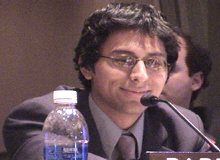 He attended the Conference in 2003 and described how the participants heard speakers from various embassies in Washington and later, in role-playing situations, each took on the role of certain member states. Part of the program is also to come to New York for a conference at the United Nations. Max’s final comment was: “When you are exposed to diversity, you come to love it pretty quickly.”
He attended the Conference in 2003 and described how the participants heard speakers from various embassies in Washington and later, in role-playing situations, each took on the role of certain member states. Part of the program is also to come to New York for a conference at the United Nations. Max’s final comment was: “When you are exposed to diversity, you come to love it pretty quickly.”
Second Afternoon Panel
Walking the Media Tightrope
Bhaskar Menon
Editor, UNDiplomatic Times
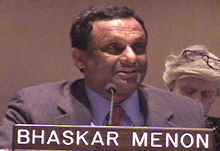 Bhaskar Menon, who has worked both within the UN and parallel to it for 35 years, and who produces a paper pointedly called “UNDiplomatic Times,” felt able to give an inside/outside perspective of the UN and the media. He feels that the United Nations gets a bad press because the issues it deals with are seldom reported, and consequently people are ignorant of the importance of its work. Sometimes there is a deliberate distortion by journalists, reflecting national and cultural prejudices. However, he also feels that the U.N. itself is incompetent in terms of public relations. He described it as “not proactive, and lethargic in its reactive capacity.” Supporters of the U. N. feel that criticism of the institution would only serve to weaken it. Mr. Menon pointed out, however, that criticism can be productive because there is much room for improvement. Reporting more about the U. N., and developing greater awareness on the part of the U. N. on how to deal with the media, could only strengthen and improve the institution.
Bhaskar Menon, who has worked both within the UN and parallel to it for 35 years, and who produces a paper pointedly called “UNDiplomatic Times,” felt able to give an inside/outside perspective of the UN and the media. He feels that the United Nations gets a bad press because the issues it deals with are seldom reported, and consequently people are ignorant of the importance of its work. Sometimes there is a deliberate distortion by journalists, reflecting national and cultural prejudices. However, he also feels that the U.N. itself is incompetent in terms of public relations. He described it as “not proactive, and lethargic in its reactive capacity.” Supporters of the U. N. feel that criticism of the institution would only serve to weaken it. Mr. Menon pointed out, however, that criticism can be productive because there is much room for improvement. Reporting more about the U. N., and developing greater awareness on the part of the U. N. on how to deal with the media, could only strengthen and improve the institution.
Danny Schechter
Founder and Executive Director, Media Channel; Founder and Vice-President/Executive Producer, Globalvision, Inc.
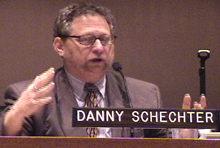 Mr. Schechter followed up on Mr. Menon’s remarks by stating that a closet would be large enough to hold a conference of reporters who care about the U. N. Young people learn about critical global issues like poverty and Aids through the media, but the media have failed them. The media fell “hook, line and sinker” for the U.S. government claims of weapons of mass destruction in Saddam’s Iraq, and even the presidents of major TV networks have admitted that the American people were let down by a policy of deliberate disinformation. How can we have democracy, Mr. Schechter asked, if people are not informed? Four times as many people watch the cartoon channels as watch network news. Students need to be taught media literacy and critical thinking. Mr. Schechter feels so strongly on this point that he has produced a film, Weapons of Mass Deception, which he urged the audience to see (www.wmdthefilm.com).
Mr. Schechter followed up on Mr. Menon’s remarks by stating that a closet would be large enough to hold a conference of reporters who care about the U. N. Young people learn about critical global issues like poverty and Aids through the media, but the media have failed them. The media fell “hook, line and sinker” for the U.S. government claims of weapons of mass destruction in Saddam’s Iraq, and even the presidents of major TV networks have admitted that the American people were let down by a policy of deliberate disinformation. How can we have democracy, Mr. Schechter asked, if people are not informed? Four times as many people watch the cartoon channels as watch network news. Students need to be taught media literacy and critical thinking. Mr. Schechter feels so strongly on this point that he has produced a film, Weapons of Mass Deception, which he urged the audience to see (www.wmdthefilm.com).
During the question period that followed this panel, Danny Schechter elaborated on some of his criticism of the media today, which is so deferential to power. Journalists who are critical, from whatever side, are sometimes threatened and even killed.
Matt Davies, Editorial Cartoonist, The Journal News; 2004 Pulitzer Prize and Herblock Prize winner
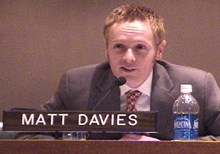 Matt Davies described his cartoon as a “wiggled down” version of Danny Schechter’s fast-paced deluge of words. He gave a hilarious description of how he had become a cartoonist — the red-haired kid at the back of the class who kept on drawing instead of taking notes and always had a problem with authority. He gave credit to a teacher who believed in him, that the creation of effective cartoons requires as much intelligent reading as verbal reports on the current conditions of the world. Cartoons are irreverent, show different perspectives, ask questions, and irritate like a pebble in a shoe. They are anathema to corporate media, although Mr. Davies admitted he is employed by the Gannett organization, which, however, is not one of the giants. “There is this little square that is left, and I am like the angry reader who ‘has to write a letter’ about what he reads in the paper. I don’t write, I draw.”
Matt Davies described his cartoon as a “wiggled down” version of Danny Schechter’s fast-paced deluge of words. He gave a hilarious description of how he had become a cartoonist — the red-haired kid at the back of the class who kept on drawing instead of taking notes and always had a problem with authority. He gave credit to a teacher who believed in him, that the creation of effective cartoons requires as much intelligent reading as verbal reports on the current conditions of the world. Cartoons are irreverent, show different perspectives, ask questions, and irritate like a pebble in a shoe. They are anathema to corporate media, although Mr. Davies admitted he is employed by the Gannett organization, which, however, is not one of the giants. “There is this little square that is left, and I am like the angry reader who ‘has to write a letter’ about what he reads in the paper. I don’t write, I draw.”
Mr. Davies concluded by saying that he is concerned that the number of cartoonists is declining. There are about 85 salaried editorial cartoonists today as opposed to 150 ten years ago. They are controversial, so when there are budget cuts, “get rid of the cartoonist.” He hopes, however, that there is a new generation of cartoonists, and he hopes that some of them are already drawing at the back of the class and have supportive teachers!
Mr. Davies’ presentation was concluded with a slide demonstration of some of his personal favorite cartoons. For additional information on the Association of Editorial Cartoonists, of which Mr. Davies is president, and to download material for classroom use, go the website http://info.detnews.com/aaec/.
Special Guest
Walter Cronkite
Special Correspondent, CBS and retired CBS Evening News anchorman
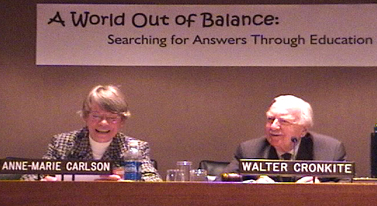 Anne-Marie Carlson, Conference Chair, welcomed Mr. Cronkite and outlined some of his outstanding accomplishments.
Anne-Marie Carlson, Conference Chair, welcomed Mr. Cronkite and outlined some of his outstanding accomplishments.
Mrs. Carlson stated that during his six decades in journalism Walter Cronkite has covered virtually every major news event at home and abroad and has earned widespread acclaim not only from the general public but also from his colleagues in journalism and from other professionals in politics and business. Best known as the former anchor and managing editor of CBS Evening News, he remains one of this country’s most trusted public figures. His reputation for integrity and unflappability was fashioned during World War II when, as a correspondent for United Press, he developed print journalism skills that demanded he get the story “fast, accurate and unbiased.”
In addition to World War II, he has covered such history-making events as: the U.S. space program; the assassinations of President John F. Kennedy, Dr. Martin Luther King, Jr., and Senator Robert Kennedy; the Watergate scandal; the hostage crisis in Iran; his landmark interview with Anwar Sadat and Menachem Begin; the Vietnam War; and, more recently, John Glenn’s return to space. He is the recipient of this nation’s highest civilian award, the Presidential Medal of Freedom, which was presented by President Jimmy Carter. Among the causes he staunchly supports are several of particular interest to those attending this conference: the causes of education, free speech and a free press. Mrs. Carlson opened her conversation with Mr. Cronkite by asking him to share with the audience one issue that particularly concerns him.
In response, Mr. Cronkite stated that before he addressed her question, he wanted to take the opportunity to disagree with certain of the comments of Danny Schechter. Although he agreed with many of Mr. Schechter’s points, he did not agree with the “total picture” portrayed by Mr. Schechter. An example he gave was that Mr. Schechter had characterized the Weapons of Mass Destruction story as a journalistic failure. He felt that the media was misled by those in power.
Returning to Mrs. Carlson’s question, he answered that his greatest concern is the arrogance of this administration in the field of foreign policy. It is his opinion that our current policies have made this a much more dangerous world and turned those who once admired us into a “nest of discontent.” He contrasted the present situation with the gratitude after World War II that the U. S. had saved Europe from the Nazis, and also made reference to the Marshall Plan. He then referred to Secretary of State Rice’s “friendship tour of Europe,” and stated that if her purpose is to show that “We are all friends,” she will not convince Europeans if we continue with the policy that “We can do whatever we damn please.”
The next question posed by Mrs. Carlson concerned the topic: How can the media be encouraged to assign greater priority to covering the critical but often less dramatic contributions of the United Nation? Mr. Cronkite’s response was that the question was “turned around.” The U.N. itself could hire top-notch public relations people and, when they have a good idea, propagandize it.
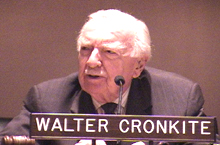 He went on to say that the biggest problem in the press today is education. “We are an uneducated people.” The market place today requires that publications make money. They cannot make a profit unless they publish what people are interested in. Our problem today is that we have to educate our young people. We need to spend more money to hire and pay teachers. The lack of adequate support for education is one of the great crimes in this country. He then continued by stating, “We need to have an educated public that can run our own democracy.” Mr. Cronkite than closed his remarks with a quotation from Thomas Jefferson: “The nation that would be ignorant and free expects what never can and never will be.”
He went on to say that the biggest problem in the press today is education. “We are an uneducated people.” The market place today requires that publications make money. They cannot make a profit unless they publish what people are interested in. Our problem today is that we have to educate our young people. We need to spend more money to hire and pay teachers. The lack of adequate support for education is one of the great crimes in this country. He then continued by stating, “We need to have an educated public that can run our own democracy.” Mr. Cronkite than closed his remarks with a quotation from Thomas Jefferson: “The nation that would be ignorant and free expects what never can and never will be.”
Mrs. Carlson closed the session by thanking Mr. Cronkite for his contribution to this conference and announced that in honor of his joining us this afternoon, the Committee on Teaching About the United Nations (CTAUN) was donating a check for $1000 to UNICEF.
Other Highlights
Carmel Mulvany, Chief of the U.N. Works Programme, Educational Outreach Section.
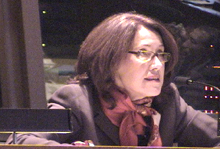 Carmel Mulvany, was introduced at the start of the morning’s program. Ms. Mulvany described the video series on the lives of children in many parts of the world that has been produced by the U.N. Works Programme and demonstrated one of these videos at that time. Samples of additional videos and a demonstration of the group’s website were presented at various times between speakers throughout the day.
Carmel Mulvany, was introduced at the start of the morning’s program. Ms. Mulvany described the video series on the lives of children in many parts of the world that has been produced by the U.N. Works Programme and demonstrated one of these videos at that time. Samples of additional videos and a demonstration of the group’s website were presented at various times between speakers throughout the day.
The “What’s Going On?” website by th UN Works Programme
CTAUN’s 2004 Best Practices Award
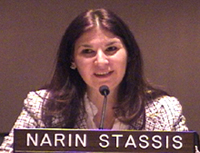 The CTAUN Session, presided over by Narin Stassis, First Vice-Chair and Phyllis Hickey, Second Vice-Chair of CTAUN presented the Best Practices Award to Dianne Kehoe of the Richmond Academy in Louisdale, Nova Scotia. Ms. Kehoe’s 12th grade students engaged in money-raising activities to support the UNICEF teacher education project in Afghanistan.
The CTAUN Session, presided over by Narin Stassis, First Vice-Chair and Phyllis Hickey, Second Vice-Chair of CTAUN presented the Best Practices Award to Dianne Kehoe of the Richmond Academy in Louisdale, Nova Scotia. Ms. Kehoe’s 12th grade students engaged in money-raising activities to support the UNICEF teacher education project in Afghanistan.
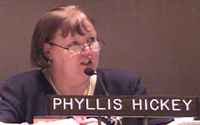 Their donation of $750 will pay the salary of a teacher for one year. The class then formed an Interact Club with the support of a nearby Rotary International Club to set up communications with students in Nepal, a country similar in size and population to their own province of Nova Scotia.
Their donation of $750 will pay the salary of a teacher for one year. The class then formed an Interact Club with the support of a nearby Rotary International Club to set up communications with students in Nepal, a country similar in size and population to their own province of Nova Scotia.
Dr. Nancy Brown, Dean of the Graduate School at the College of New Rochelle announced a new graduate course now being offered for one credit for participants at CTAUN conferences. Those interested in more information about this course were advised to contact Mr. David Leonard atdleonard@cnr.edu or at 914-654-5344.
Info Fair Exhibitors
American Forum for Global Education– Ria Boemi (www.globaled.org)
Provides leadership and assistance to school systems, state departments of education, and colleges and universities, fostering students’ ability to think about issues in a global context and make connections with their own lives.
Congressional Youth Leadership Council– Grant Burrall (www.cylc.org)
Offers educational leadership conferences for outstanding youth from around the world.
ECPAT-USA (End Child Prostitution, Child Pornography & Trafficking of Children for Sexual Purposes)– Carol Smolenski (www.ecpatusa.org)
A network of organizations and individuals seeking to ensure that all children are free from sexual exploitation.
Global Kids – Project Newz Crew– Barry Joseph (www.newzcrew.org)
An internet forum for students to discuss issues in the news.
Hague Appeal for Peace– Sabrina Esufali (www.haguepeace.org)
A network of individuals and organizations dedicated to the abolition of war, through advocacy and training in peace education.
Institute of International Education (lIE)– Daniel Obst (www.iie.org)
Administers the Fulbright and Humphrey fellowships for the State Dept. and the People, Energy and Development program for USAID; conducts policy research and provides counseling on international education and opportunities abroad.
Inter-Agency Network on Education In Emergencies (INEE)– Allison Anderson (www.ineesite.org)
Through its website, promotes inter-agency communication and provides information, learning materials, guidelines and training opportunities to educators worldwide working in emergency situations and areas of chronic instability; affiliated with the International Rescue Committee.
International Education and Resource Network (iEarn)– Lisa Jobson (www.iearn.org)
Uses the internet to promote interactive, project-based partnerships among schools worldwide.
International Labour Organization (ILO)– Djankou Ndjonkou (www.ilo.org)
The UN specialized agency promoting social justice in the labour field; formulates standards of basic labour rights, and provides technical assistance, training and advisory services on labour-related issues, especially for children.
International Movement AID Fourth World– Vicki Soanes (www.4thworldmovement.org)
Works to ensure respect for the human rights of those in extreme poverty through personalized correspondence, and a newsletter in English, French and Spanish; sponsors the Tapori network (www.tapori.org) for correspondence among children worldwide.
Media Channel/Global Vision– Danny Schechter (www.mediachannel.com)
A non-profit international website focused on media, featuring reading resources, teaching tools, issue guides and access to a worldwide network of organizations and publications on media and education.
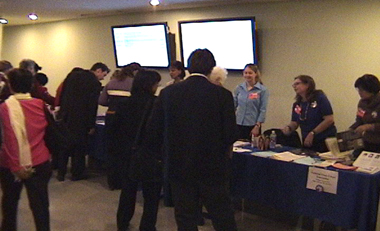
National Peace Corps Association– Ellen Frierson (www.rpcv.org)
An organization of former Peace Corps volunteers working to provide global education in US classrooms via a newsletter GlobalTeach net (www.teachnet@rpcv.org) and web-based project Kids Around the World (www.katw.org).
NetAid– Natalie Wooller (www.netaid.org)
Mobilizes people in developed countries to end extreme poverty-through Its Global Citizens Corps, action awards, games for global ed., online campaigns and World Schoolhouse project.
Seeds of Peace– Barbara Gottschalk (www.seedsofpeace.org)
Runs an international camp in Maine to promote friendships among teens from four areas of conflict: the Middle East, Cyprus, the Balkans and South Asia.
SOS Klnderdorf International – SOS Children’s Villages– Elisabeth Kofler Shuman (www.sos-childrensvillages.org)
Builds villages around the world to provide a permanent home, family-like structure and stable environment for orphaned and abandoned children.
United Nations Children’s Fund (UNICEF)– Judith Yemane (www.unicef.org)
Works in 161 countries and territories in the areas of disease prevention, safe childbirth, nutrition, sanitation and education – see also Teachers Talking About Learning (www.unicef.org/teachers); also provides emergency response in times of crisis
United Nations Development Fund for Women (UNIFEM)– Yvans Joseph (www.unifem.org)
Provides financial & technical assistance to programs promoting women’s human rights, political participation and economic security, and links women’s issues to national, regional and global agendas.
United Nations Development Programme – Office of Communication (UNDP)– Daniel Shepard (www.undp.org)
The UN’s global development network connecting countries to the knowledge, experience and resources to help people build a better life; publishes CHOICES (the Human Development Magazine).
United Nations Development Programme – Office of Communication (UNDP)– Daniel Shepard (www.undp.org)
The UN’s global development network connecting countries to the knowledge, experience and resources to help people build a better life; publishes CHOICES (the Human Development Magazine).
United Nations Educational Outreach – Department of Public Information (DPI)– Maria Chavez (www.un.org/dpi)
The communications link between the UN and its affiliated non-governmental organizations (NGOs) through briefings, workshops, orientation for new NGO representatives and an annual 3-day conference in September; it also provides UN documents, press releases and a video lending library of UN films.
Sponsors:
1. Cyberschoolbus– Bill Yotive (www.un.org/cyberschoolbus)
An online resource disseminating information on international issues and the UN through teaching materials and activities designed for use at primary, intermediate and secondary levels, and for teacher training.
2. UN Chronicle– Russell Taylor; Belal Hassan (www.un.org/chronicle)
The magazine of the United Nations, with articles on global issues on the UN agenda, economic and social development, the arts in a global context, etc.
3. UN Works– Carmel Mulvany; Belal Hassan (www.un.org/works)
Produces videos and offers a website featuring the stories of men, women and children who have benefitted from the UN’s work.
United Nations Millennium Goals Campaign– Amil Husain (www.un.org)
Informs, inspires and encourages involvement and action toward achieving the UN’s eight Millennium Development Goals, (MDGs) and reports on their progress and implementation.
United Nations Office for Coordination of Humanitarian Affairs (OCHA)– Rania Barrimo (www.reliefweb.int/ocha-ol/)
Advocates humanitarian issues with political organs of the UN, notably the Security Council, and coordinates efforts to ensure appropriate humanitarian responses on the ground in emergency situations.
United Nations Office of the High Commissioner for Refugees (UNHCR)– Yusuf Hassan (www.unhcr.org)
Leads and co-ordinates international action to safeguard the rights and well-being of refugees and resolve refugee problems worldwide.
Vital Voices– Wenchi Yu Perkins (www.vitalvoices.org)
Invests in women who are leaders in their own countries, to expand their leadership roles, create business opportunities, and protect human rights around the globe.
Women’s Commission for Refugee Women and Children– Megan McKenna & Lori Heninger (www.womenscommission.org)
Works to improve the lives of refugees and internally displaced women, children and adolescents.
World Organization for Early Childhood Education (OMEP)– Kate Kolchin (www.omep-usnc.org)
Publishes the Int’l Journal of Early Childhood twice a year; holds regional seminars, and a World Assembly on EC education.
`

